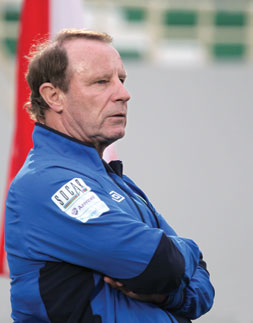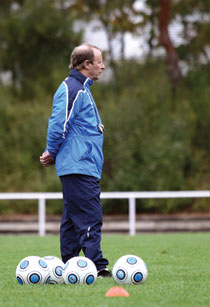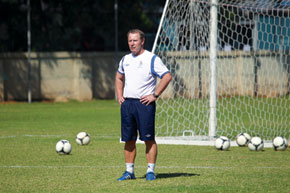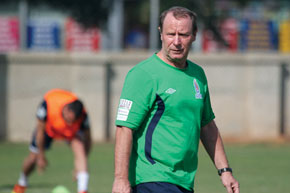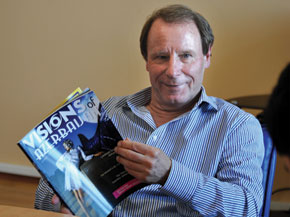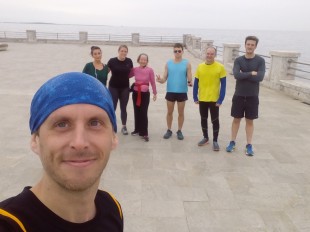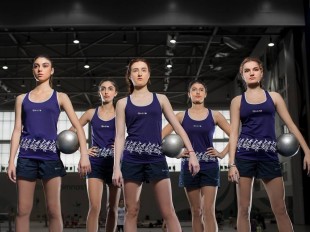Berti Vogts talks to Visions’ Agshin Aliyev about training, dodgy decisions and Messi or Ronaldo.
AZERBAIJANI FOOTBALL ON THE UP
April 2013 marked the fifth anniversary of your appointment as head coach of the Azerbaijan national team. When you first came, did you expect to be here for so long?
No. I’d watched several of Azerbaijan’s matches so I knew what to expect. It was very difficult at the beginning, because the older players dominated the team. At the same time there was no professionalism. I thought that I would work with the Azerbaijan national team for one year and then go back, as my predecessors had done. The fact that I have been head coach for so long shows that Azerbaijani football federation AFFA and I have worked well together. The leadership of AFFA have faith in me.
There is no doubt that many positive changes have taken place in football in Azerbaijan over these five years. The facilities of local clubs have greatly improved. The stadiums built with the sponsorship of the State Oil Company of the Azerbaijan Republic in recent years are obvious examples of development. The U-17 Women's World Cup in Azerbaijan last year and the U-17 European Championship scheduled for 2016 allow the country to show itself in Europe.
The positive changes also concern the national team. Many young players already play for the Azerbaijan national team. We have had good performances in matches against big teams – Russia, Turkey, and other sides, so I can say that I am satisfied with my work.
Club football is also enjoying success. Azerbaijani clubs used to get no further than the preliminary rounds of the European competitions, but last summer Neftchi qualified for the Europa League group stage. AFFA and the Professional Football League are doing a good job working to bring Azerbaijan up to the European average. We just need time to see the results. Unfortunately, there is no time in football. Everyone is impatient for results.
FOOTBALL NOT NO 1 IN AZERBAIJAN
What is the biggest problem in Azerbaijani football? Why do Azerbaijanis not play football as well as players from the developed football nations?
Can you say why Americans go to the Moon, but Azerbaijanis don’t?
We do! Azerbaijan has just launched its first satellite into orbit.
Then it didn’t reach its destination (laughs). Actually, you’ve asked me a difficult question, but I will answer it. The main reason is that football is not the number one sport in Azerbaijan. Other types of sport, such as chess and wrestling, are more developed here. But football is a team game.
We are working to develop football in Azerbaijan. The Azerbaijan national team five years ago was very different from the one we have now. Football fans watch the Champions League in the evening and the next day want to see the same level when they go to watch the Azerbaijan championship. However, it’s impossible at present.
It is important to attract children to football when they are little so that they are already mature players by the time they reach the age of 16-17. In Germany, children begin playing football when they are eight and train three times a week. That’s more than some Azerbaijani clubs that consider themselves professional! They have to work on themselves, make progress and be transferred to foreign clubs.
For example, a few months ago, Ruslan Abishov was transferred to Russian club Rubin. He hasn’t made many first-team appearances yet, but we hope that he will soon establish himself. But not all the Azerbaijani players manage to do so. Some look for transfers abroad simply from the financial point of view and, as a result, get things wrong. Others are satisfied with what they earn in Azerbaijan and stunt their careers. Life in Azerbaijan seems easy for the players. They earn a lot of money. Even if they want to go abroad, they stay in Azerbaijan when they realize that they will earn less elsewhere. The fan that watches Bayern play Barcelona in the Champions League then wonders why Azerbaijani players don’t play so well.
What bothers you most in your work, bearing in mind that Azerbaijan is not a football country?
What frustrates me most of all is that our progress is very slow. We move forward with small steps. I would like the development of Azerbaijani football to be more rapid. We should pay attention to children’s and youth football. We should require more of children so that they can be developed like professional footballers. But I can see that in Azerbaijan a player gets comfortable when he is praised. He thinks that he has achieved everything and does not work on himself any more. I don’t like this.
CRITICISM COMES WITH THE TERRITORY
What is it like to be the coach of a team that is constantly criticized?
We have to get used to criticism. If it’s fair criticism, you need to report back and explain. But sometimes the criticism is unfair. I think that it’s not right to criticize only one person. Besides the coach, it is important to take into account the people around him as well as the players. I am a coach who builds a team based on the players’ preparedness, not my personal likes and dislikes. I appreciate a player who works hard, is skilful and diligent.
During your five years working in Azerbaijan, the fans have called for your resignation several times. The last time was in March during the defeat to Portugal in Baku. Do the fans’ chants irritate you?
Football fans make emotional decisions. I think this is normal. But you mentioned the last game with Portugal as an example. In that match, our forward Rauf Aliyev was shown a yellow card twice within four minutes, letting our team down. Then, we lost the match 2:0 and the fans called for my resignation. This happens in football, but chants for me to resign do not bother me in my work.
At the low points have you ever thought of resigning and leaving Azerbaijan?
I knew what was required of me when I came here. A young, promising team needed to be built. The agreement with AFFA will finish at the end of this year. If I leave the Azerbaijan national team at the end of 2013, I will know that I have made my mark in building the football house in Azerbaijan.
SLIM CHANCE OF EURO QUALIFICATION
You have said that Azerbaijan can qualify for the final stages of the European Championships in France in 2016. How realistic are those chances, since Azerbaijan is so far in last place in the group? Or, maybe it’s just a bit of populist rhetoric?
I think that we have a slight chance. It all begins with the draw. First, we have to have the luck of the draw. Who have our opponents been in the last five years? Germany, Turkey, Russia, Belgium, Portugal... However, instead of these teams, we could have drawn Norway. After the draw, a lot also depends on the scheduling of the games. Unfortunately, Azerbaijan is a small country so it’s not able to push its demands during discussions of the schedule. I’m trying to say that we have a slight chance of reaching Euro-2016. We can do it by taking third place in the group.
HIGHS AND LOWS
What are your best and worst matches as coach of the national team?
Last October I was wound up because a penalty was given against us in the final minutes of the match with Russia. There had been a foul but outside the penalty area. We were close to a sensational result. I really wanted us to get a point against Russia, but we lost the game 1:0 because of a refereeing mistake. Our best result has to be the 1:0 win over Turkey. We wanted to show our brothers that we can play football too and we achieved that.
What do you think about the future of football in Azerbaijan?
I am optimistic about the future of football in Azerbaijan. Five years ago, the clubs said that they did not have any facilities, but now they have stadiums and academies. But it is not only about infrastructure. Football in this country won’t develop if the coaches and players don’t work on themselves. It is not the fans or journalists criticizing me that most makes me angry. I get angry when I see empty pitches in the regions. Nobody is training there. Football is very important for Azerbaijan. In the modern day, football is also a social issue.
PLAYER OR COACH?
What do you see as more successful – your career as a player or a coach?
As a player. I was champion of Germany five times, won the UEFA Cup twice, and became World and European champion.
Your greatest coaching success was in 1996 when Germany won the European Championship. But in the past 17 years you haven’t won any trophies as a coach. What is the reason for this decline?
The reason is the quality of players. What can we win with the Scottish national team? With another team where I was head coach – Kuwait – I took third place in the Gulf Cup. With Nigerian players we lost to Ghana in the semi-final of the African Cup of Nations.
Why have Germany not won a title since you left? Since 1996, Germany haven’t won a World Cup or European Championship.
It seems to me that there are many young players in the German national team, so the lack of experience causes mistakes. There is no room for mistakes in international competition. If we look at recent World Cups and European Championships, we’ll see that Germany didn’t play so well against either Italy or Spain in the semi-finals or finals so they lost.
My greatest achievement as a coach was not winning the European Championship with Germany in 1996, it was as assistant coach to Franz Beckenbauer when Germany won the World Cup in 1990. Of 22 players in the squad, I had nurtured 20 of them. I found those players and got them into the national team. I mean, I understand this job.
MRS VOGTS ON OLIVER BIERHOFF
Going back to Euro-96, I would like to ask you about one more interesting story. They say that you did not think about taking Oliver Bierhoff who went on to score twice against the Czech Republic in the Euro-96 final, including the decisive golden goal. Is it true that you added Bierhoff to the squad only at your wife’s insistence?
I’ve read about this too, but it’s not true! Bierhoff played under my management in the U-18 and U-21 sides. Although, he moved to Hamburg when he was 18, he didn’t really make it there. I helped him get a transfer to an Austrian club and he established himself as a striker in the Austrian championship. That’s when his career began to take off. Bierhoff played for Udinese and Milan, but when he was called up to the national team for the first time in 1991, he had a poor debut so he wasn’t called up for four years. Selection for the national team is done differently in Germany than Azerbaijan. On the eve of Euro-96, we had a lot of injuries so I decided to take Bierhoff to the championships. That’s the Bierhoff story.
MESSI OR RONALDO?
The question of the moment – Lionel Messi or Cristiano Ronaldo?
I think that Ronaldo is stronger. Opponents play more aggressively against Ronaldo than against Messi. Besides, Lionel Messi does not do well for the Argentine national team. However, I would like to single out one more player – Bastian Schweinsteiger. He is the beating heart of both Bayern and the German national side.
Who do you think is the best coach in the world?
That’s a difficult one. There may be a very talented coach working in an outlying village, who has no opportunity to make his name. At present, I consider the outgoing Bayern head coach, Jupp Heynckes, the best in the world. There are also strong professionals in Barcelona. The team has a new style. But before Josep Guardiola, Johan Cruyff laid the foundation of their style of possession and short passing. Although Spain won the last World Cup and European Championships, their cycle finished two years ago. If we look at who has had achievements at club level over many years, then we should mention Sir Alex Ferguson who has just retired from Manchester United. Since 1986 he had great success both in domestic and European competitions and at the same time fostered young players. Sir Alex Ferguson is number one in this sphere.
IN LOVE WITH BAKU
How do you spend time in Baku? Do you get bored or lonely here?
Baku is a very beautiful city. I have really fallen in love with Baku. I would suggest to every European that they spend at least a few days in Baku. It is worth seeing such a beautiful city. Azerbaijan long since integrated into Europe. People here are affable and friendly. I only regret that very few people in Baku speak English. During training camps the players have two hours of English-language courses every day so that when they go abroad they are able to communicate and express their thoughts. Not only Baku, also Qabala, Lankaran, and other regions are beautiful.
What do you like in Baku most of all? Where do you like to walk?
I like the Icheri Sheher (the old walled inner city) very much. The old historic buildings there create a good atmosphere. I like Azerbaijani cuisine. I can say good words particularly about the people of Baku. They are openhearted, simple and kind, always ready to help. The only thing Baku people cannot do is drive a car!
Do people ever bother you when you are out and about, asking why the team isn’t doing so well?
People approach me only rarely and when they do it is with great respect. This is part of Azerbaijani culture. They don’t want to spoil my leisure time. I haven’t faced any problems here.
Have you turned down any attractive job offers while you’ve been working in Azerbaijan?
I’m not usually too keen on answering such questions. I just say that there have been offers. For example, I had two offers recently. I could have signed a contract, but I promised the AFFA management that we would not leave our job half done and will achieve our aim.
Were those offers at club or national level?
Club level, but I won’t go in to details.
You won’t be too keen to answer my next question either. Various figures are given in the press about your salary as Azerbaijan’s head coach, but you’ve never officially disclosed the sum you receive from AFFA. Famous coaches and players often do not hide their salary – can you reveal the sum exclusively to Visions of Azerbaijan magazine?
What do they say about my salary?
That you receive one or two million US dollars.
(Laughing) Not enough.
CHEER US ON!
Thank you for giving us so much of your time. To close the interview, we would like to know what you wish Azerbaijanis, particularly our compatriots who live in Europe, since they regularly go to the national side’s games.
When we play away, we see how enthusiastically Azerbaijanis living abroad come to our hotel or the stadium. We are very pleased about it. They are so glad to meet the players of the national team and have photos taken with them. I can say that I haven’t even seen such love in Germany. I would like to encourage all Azerbaijanis living in Europe to come to the Azerbaijani national team’s matches and cheer us on to victory to the end.
Berti Vogts
Full name: Hans-Hubert Vogts
Born: 30 December, 1946, in Büttgen, Germany
Played for only one club: Borussia Mönchengladbach, 1965-1979
Honours as a player: five Bundesliga titles, two UEFA Cups
Head coach of Germany’s U-21s, 1979-1990
Assistant coach of German national side, 1986-1990
Head coach of German national side, 1990-1998
Head coach Bayer Leverkusen, 2000-2001
Head coach Kuwait, 2001-2002
Head coach Scotland, 2002-2004
Head coach Nigeria, 2007-2008
Head coach Azerbaijan, 2008 to present
Coaching honours: as assistant coach, 1990 World Cup
As head coach, 1996 European Championship
Vogts in Azerbaijan
Selected as coach by AFFA from a long list of 400 coaches and short list of five
Known for tough discipline – dropped Ilgar Gurbanov for eating a hamburger, Javid Imamverdiyev
for oversleeping and Araz Abdullayev for arguing
Played 56 matches
Won 12
Lost 28
Drawn 16
Goals scored 43
Goals conceded 82
